Dubuque, Iowa 作者: 来源: 发布时间:2021-11-04
I.Population and Area
₋Area
Land: 30.62 sq mi (79.29 km2)
₋Population
Total: 57,882
Density: 1,890.58/sq mi (729.96/km2)
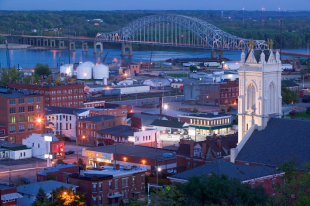
II.Natural Geography
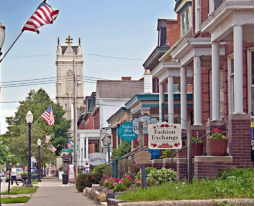
City Night View & Street View
₋Dubuque /dəˈbjuːk/) is the county seat of Dubuque County, Iowa, United States, located along the Mississippi River. In 2019, the population of Dubuque was 57,882.
₋The city lies at the junction of Iowa, Illinois, and Wisconsin, a region locally known as the Tri-State Area. It serves as the main commercial, industrial, educational, and cultural center for the area. Geographically, it is part of the Driftless Area, a portion of North America that escaped all three phases of the Wisconsinian Glaciation.
₋Dubuque is a tourist destination featuring the city's unique architecture and river location. It is home to five institutions of higher education, making it a center for culture and learning.
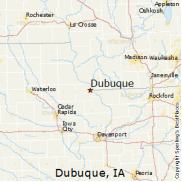
₋Dubuque has long been a center of manufacturing, but the economy grew rapidly and diversified to other areas in the first years of the 21st century. By 2005, the city led the state and the Midwest in job growth, ranking as the 22nd-fastest growing economy in the US. Alongside industry, the city has large health care, education, tourism, publishing, and financial service sectors.
III.ECNONOMY
₋The average salary in Dubuque, IA is $55k. Trends in wages decreased by -100.0 percent in Q1 2020. The cost of living in Dubuque, IA is 11 percent higher than the national average. The most popular occupations in Dubuque, IA are Project Manager, (Unspecified Type / General), Operations Manager, and Data Analyst which pay between $35k and $92k per year. The most popular employers in Dubuque, IA are Cottingham & Butler, Heartland Financial USA, Inc, and Loras College.
₋Website: https://www.payscale.com/research/US/Location=Dubuque-IA/Salary
IV.Industrial Characteristics
₋For many years, Dubuque's economy was centered on manufacturing companies such as Deere and Company and Flexsteel Industries. While industry still plays a major role in the city, the economy has diversified a great deal in the last decade. Health care, education, tourism, publishing, and financial services are all important sectors of the city's expanding business climate. Several major companies are either headquartered in Dubuque or have a significant presence in the city.
₋Other companies with a large presence in the area include Hormel, Nordstrom, Alliant Energy, Woodward Communications, Swiss Valley Farms, the Metrix Company, Rite-Hite Company, and Tschiggfrie Excavating Co.
₋In recent years, Dubuque's economy has grown very rapidly. In 2005, the city had the 22nd-highest job growth rate in the nation, far outpacing the rest of Iowa. This was a level of growth similar to those of Austin, Texas, and Orlando, Florida, among others. The city created over 10% of the new jobs in Iowa in 2005, and the number of jobs in Dubuque County reached new all-time highs, with over 57,000 people working in nonfarming jobs. Many new and existing businesses have announced significant expansion plans, including Sedgwick CMS, McGraw-Hill Higher Education, Deere and Company, Cottingham & Butler, Quebecor World Inc., and Namasco.
V.Attractions
1. National Mississippi River Museum & Aquarium
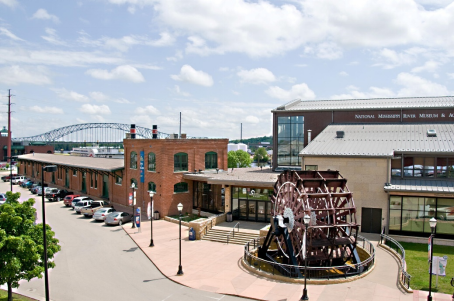
₋The National Mississippi River Museum & Aquarium is a museum located in Dubuque, Iowa, USA. The museum is a property of the Dubuque County Historical Society, with two centers on the riverfront campus: the Mississippi River Center and the National River Center. The museum originally opened as the Fred W. Woodward Riverboat Museum in 1982 before being expanded and re-organized into its current form.
₋The museum is an affiliate of the Smithsonian Institution, and is accredited by the American Alliance of Museums (AAM) and the Association of Zoos and Aquariums (AZA).
₋The National Mississippi River Museum & Aquarium is home to museum exhibits on the culture and history of America's rivers. The campus also includes over a dozen aquariums featuring wildlife representative of that found in the Mississippi River and the Gulf of Mexico and other river systems and deltas, including giant catfish, sturgeon, ducks, frogs, turtles, rays, octopus, river otters, and more. There are also outdoor exhibits, featuring river otters, a marsh, and large artifacts, such as boats, a blacksmith shop, a stream, and raptor aviaries including bald eagle.
₋Address: 350 E 3rd St, Dubuque, IA 52001, United States
₋Phone: +1 563-557-9545
₋Website: https://www.rivermuseum.com/
2.Dubuque Arboretum and Botanical Gardens
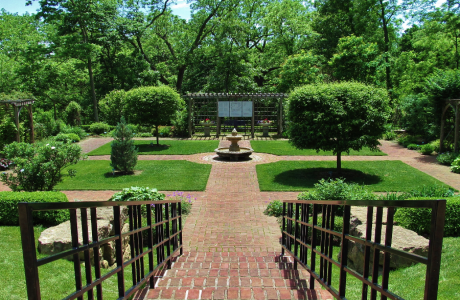
₋The Dubuque Arboretum and Botanical Gardens 52 acres (210,000 m2) are an arboretum and botanical gardens established in 1980 and located at 3800 Arboretum Drive, Dubuque, Iowa. It is open, without charge, daily (from dawn to dusk) throughout the year. The arboretum is the largest in the United States staffed entirely by volunteers. (About 300 community volunteers help maintain the gardens.) The Arboretum is a popular spot in the community for outdoor weddings and is also a venue for musical entertainment during the summer months (Music in the Gardens, 6:30p Sunday evenings).
₋The Gardens include what is claimed to be the largest public hosta garden in the United States (13,000 plants representing over 700 varieties), as well as Annual and Perennial Gardens, several Children's gardens, an English Knot garden and Formal English Garden, Herb Garden, Cactus garden, Iowa State and All American Test Gardens, Japanese garden designed by Hoichi Kurisu, and Rose Gardens. Also notable are the collections of unusual conifers and dwarf conifers.
₋Address: 3800 Arboretum Dr, Dubuque, IA 52001, United States
₋Opened: 1980
₋Website: https://dubuquearboretum.net/
3.Eagle Point Park

₋Eagle Point Park is a 164-acre (0.66 km2) public park located in the northeast corner of the city of Dubuque, Iowa, United States. Eagle Point is mostly situated on a bluff that overlooks the Mississippi River and the Lock and Dam No. 11. The park is owned and operated by the city of Dubuque. It was listed as a historic district on the National Register of Historic Places in 2017. At the time of its nomination it contained 34 resources, which included 14 contributing buildings, seven contributing sites, five structures, five objects, two non-contributing buildings, and two non-contributing structures.
₋The Eagle Point site was selected by Charles Mulford Robinson, who wrote a report, "Report on the Improvement of the City of Dubuque, Iowa". A committee, led by Judge Oliver Perry Shiras, was formed and the property was acquired by the city in 1908. The park was opened in 1909. During the Great Depression, as part of the Works Progress Administration program the park was expanded and renovated. President Franklin D. Roosevelt viewed the park and said, "This is my idea of a worthwhile boondoggle". Architect Alfred Caldwell directed the building of many of the structures at the park, which made use of the limestone found in the area. These include the pavilions, the fish pond, the areas around the fish pond, and a bandshell for public concerts. A large statue of an eagle was placed near the entrance to the park. At one time the city offered regular bus service to and from the park, and a shelter was built for bus passengers. Today that shelter is used as an information center.
₋The Riverwalk, situated along the edge of the bluff, has views of the Mississippi, the Lock and Dam, the city of Dubuque, and Grant County, Wisconsin. The park offers tennis courts, horseshoe pits, playground equipment, a band shell with free music concerts, and a small wading pool for young children. The park charges a one dollar admission fee for automobiles, and a five dollar fee for buses to enter the park. There is no fee for pedestrians. The park's season runs from May 1 to October 31. During the off season the park is closed to vehicle traffic, but people can park near Eagle Point's rear entrance and walk into the park.
₋Below the park is the site of the Eagle Point Bridge, which was torn down in the 1980s.
₋Note that there is also an Eagle Point Park located in Clinton, IA.
₋Address: 2601 Shiras Ave, Dubuque, IA 52001, United States
₋Open: May to October
₋Phone: +1 563-589-4263
₋Website: https://www.cityofdubuque.org/573/Eagle-Point-Park
VI.History
₋Spain gained control of the Louisiana Territory west of the Mississippi River following the 1763 defeat of the French in the Seven Years' War; the British took over all territory to the east, as well as Canada.
₋The first permanent European settler in what is now Dubuque was Quebecois pioneer Julien Dubuque, who arrived in 1785. In 1788, he received permission from the Spanish government and the local Meskwaki American Indians to mine the area's rich lead deposits. Control of Louisiana and Dubuque's mines shifted briefly back to France in 1800, then to the United States in 1803, following the Louisiana Purchase. Dubuque died in 1810. The Meskwaki continued to mine with full support of the U.S. government until 1830, when the Meskwaki were illegally pushed out of the mine region by American prospectors.
₋The current City of Dubuque was named after Julien Dubuque, settled at the southern end of a large flat plain adjacent to the Mississippi River. The city was officially chartered in 1833, located in unorganized territory of the United States. The region was designated as the Iowa Territory in 1838, and was included in the newly created State of Iowa in 1846. After the lead resources were exhausted, the city became home to numerous industries. Dubuque became a center for the timber industry because of its proximity to forests in Minnesota and Wisconsin, and was later dominated by various millworking businesses. Also important were boat building, brewing, and later, the railroad industry. In 1874, the Diamond Jo Line moved its company headquarters to Dubuque. Diamond Jo Line established a shipyard at Eagle Point in 1878. Just two years later, the company was the largest employer in Dubuque, putting 78 people to work, 75 of whom worked at the shipyard earning their collective $800–$1,000 per week in wages.
₋Between 1860 and 1880, Dubuque was one of the 100 largest urban areas in the United States. Iowa's first church was built by Catholics in 1833. Since then, Iowans have followed a variety of religious traditions.
₋Beginning in the mid-19th century and into the early 20th century, thousands of poor German and Irish Catholic immigrants came to the city to work in the manufacturing centers. The city's large Roman Catholic congregations led to its designation as the seat of the newly established Archdiocese of Dubuque. Numerous convents, abbeys, and other religious institutions were built. The ethnic German and Irish descendants maintain a strong Catholic presence in the city. Nicholas E. Gonner (1835-1892), a Catholic immigrant from Pfaffenthal in Luxembourg, founded the Catholic Publishing Company of Dubuque, Iowa. His son Nicholas E. Gonner Jr. (1870-1922) took over in 1892, editing two German-language weeklies, an English-language weekly, and the Daily Tribune, the only Catholic daily newspaper ever published in the United States.
₋Early in the 20th century, Dubuque was one of several sites of a brass era automobile company, Adams-Farwell; like most others, it folded. Subsequently, Dubuque grew significantly, and industrial activity remained its economic mainstay until the 1980s. During that time, a series of changes in manufacturing and the onset of the "Farm Crisis" led to a large decline in the sector and the city's economy as a whole. In the 1990s, the economy diversified rapidly, shifting away from heavy industry. Tourism, high technology, and publishing are now among the largest and fastest-growing businesses. Dubuque attracts well over 1,500,000 tourists annually, and the number continues to increase. The city has encouraged development of the America's River Project's tourist attractions in the Port of Dubuque, the expansion of the city's colleges, and the continued growth of shopping centers, such as Asbury Plaza.
VII.Other Information
₋Health and medicine
₋Dubuque is the health care center of a large region covering eastern Iowa, northwestern Illinois, and southwestern Wisconsin. On March 15, 2012, the Commonwealth Fund released its first Scorecard on Local Health System Performance; it ranked Dubuque second in the nation. The city is home to two major hospitals that, together, have 421 beds. Mercy Medical Center - Dubuque is the largest hospital in the city with 263 beds, and one of only three in Iowa to achieve "Magnet Hospital" status. Magnet Hospitals must meet and maintain strict standards, deeming them some of the best medical facilities in the country. Mercy specializes in various cardiac-related treatments, among other things, and is affiliated with Trinity Health, one of the largest Catholic health delivery system in the United States.
₋Dubuque's other hospital is The Finley Hospital, which is a member of UnityPoint Health's network of hospitals. Finley is JCAHO accredited, and as of 2007 had 158 beds. It is unofficially Dubuque's "cancer hospital," as it has significant oncology-related facilities, including the Wendt Regional Cancer Center The hospital campus has expanded in recent years, with the construction of several new buildings.
₋Among other health care facilities, the city is home to two major outpatient clinics. Medical Associates Clinic is the oldest multi-specialty group practice clinic in Iowa, and currently operates two major outpatient clinics in Dubuque, its "East" and "West" campuses. It is affiliated with Mercy Medical Center — Dubuque, and also operates its own HMO, Medical Associates Health Plans. Affiliated with the Finley Hospital is Dubuque Internal Medicine, which as of 2007 was Iowa's largest internal medicine group practice clinic.
₋Transportation
₋Highways
₋Dubuque is served by four U.S. Highways (20, 151, 61 and 52) and two state highways: (3 and 32). Highway 20 is the city's busiest east-west thoroughfare, connecting to Rockford (and I-39/I-90) and Chicago to the east, over the Julien Dubuque Bridge. In the west, it connects to Waterloo. Highways 151, 61, and 52 all run north-south through the city, with a shared expressway among the three for part of the route. Highways 52 and 61 both connect Dubuque with the Twin Cities (Minnesota) to the north, with 61 connecting to Davenport (and I-74/I-80), and 52 connecting to Bellevue to the south and then Clinton via U.S. Route 67. Highway 151 connects Dubuque with Madison, Wisconsin (and I-39/I-90/I-94) (via the Dubuque-Wisconsin Bridge) to the northeast and Cedar Rapids to the southwest. Dubuque has four-lane, divided highway connections with Cedar Rapids, Davenport, Madison, and Waterloo.
₋Iowa State Highway 3 begins in Dubuque along a shared route with Highway 52, and connects the city with central and western Iowa. Iowa State Highway 32, locally known as the Northwest Arterial, acts as a beltway for parts of the North End and West Side. Eventually, this four-lane highway will be extended southeast, to connect with highways 151 and 61 near Key West and the Dubuque Regional Airport and will be called the Southwest Arterial.
₋Airport
₋The airport's operator, the City of Dubuque, continues to court additional carriers to add service to the airport. The Dubuque Regional Airport has reported steadily increasing passenger numbers over the years, and, until recently, had service from three different carriers prior to 9/11. In early November 2007, it was announced that October 2007 was the best month ever for American Eagle airline at the Dubuque Regional Airport, according to Robert Grierson, Dubuque Regional Airport manager: "We had 4,510 total revenue passenger enplanements; that is a record for American Eagle in Dubuque. American Eagle averaged a 79.82 percent enplanement load factor. Load factors are determined by how many revenue passengers were on the plane versus how many seats are available."
₋Currently, a $23 million new terminal is being built to modernize and expand the airport. Improvements include a larger terminal, new access road, and expanded aviation parking. The new terminal at the Dubuque Regional Airport was expected to open in 2016.
₋Mass transit
₋In Dubuque, public transportation is provided by the city transit division The Jule. The Jule operates multiple daytime bus routes, late night Friday and Saturday bus routes and Minibus service, summer trolleys, and on-demand paratransit Minibus service throughout the city. The routes are based out of one or more of the three transfer locations and run in 30-minute loops. These loops serve neighborhoods, shopping areas, medical offices, and industrial parks and provide connections to other areas of the city with the 15-minute cross-town Express route. The system's three major transfer stations are Downtown Intermodal (9th & Elm St), Midtown (North Grandview & University Avenues), and the West End (Kennedy Circle/John F. Kennedy Road).
VIII.Contact Information
Government
Type: Council-Manager
Mayor: Roy D. Buol (D)
City Hall
Address:
949 Kerper Boulevard
Dubuque, Iowa 52001
For route questions, contact:
Phone: 563-589-4196
Fax: 563-589-4340
Website: https://www.cityofdubuque.org/2499/Connect-with-Us
